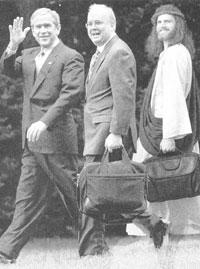He’s destined for something, alright

ush fulfills his promise to bring Jesus to the White House. (Courtesy of Scribner.)
November 7, 2006
Making fun of celebrities has become something of a national pastime. Nothing does a better job of boosting your own self-confidence quite like the act of taking down the ego of those around you. Lets take Beyonce Knowles of Destiny’s Child fame, for example. She may have millions of dollars in assets, a successful music career, movie deals, and stunningly good looks, but you know what? She’s overrated.
There, end of conversation. Beyonce may easily be more successful than me by any social measure, but in some abstract cosmic sense, I am Beyonce’s superior. Yes this is unfair and cruel, with just a dash of bitterness, but that’s ok because they are celebrities and thus lose all notion of societal restraints.
So it is in this rich American tradition of celebrity mockery that the creators of weeklyradioaddress.com have released the new book Destined for Destiny: The Unauthorized autobiography of George W. Bush. If you haven’t gone to their web site yet and listed to their regular satirical podcasts, then you might not immediately pick up on the project’s tongue-in-cheek take on our nation’s commander-in-chief. The book and website both play it straight in presentation. The cover of the books shows a rugged looking Bush, Carhart-jacketed and an arm propped up against a rustic beach wood and barbwire ranch fence. Awash in dramatic three-point lighting, nothing about the photo suggests a sense of irony. Even the book’s title, though questionably redundant, only vaguely suggests the irreverence contained within. Destined for Destiny sounds like a legitimate enough title for George Bush’s autobiography.
But a quick look at the sixteen page black and white glossy photo spread in the center of the book exposes the author’s true intent. The photo spread chronicles George’s rise from the tender innocence of a newborn babe, through his military service, and onto the leader of the current war on terror. But through it all, the common element in each photo, the man that is by Bush’s side at every step is not Carl Rove. Not Dick Cheney. But Jesus H. Christ.
Jesus baths the young baby Bush, Jesus is on the Baseball field with a collegiate Bush, and marches behind Bush, with helmet in hand, on the aircraft carrier for his famed “Mission Accomplished” speech. Obviously this is all thanks to a creative use of Photoshop, but the images are seamless and the Jesuses are inserted subtlety enough that you might have to do a double-take before you realize joke fully sets in.
But there’s something bittersweet about making fun of our president George Walker Bush. Yes from the pages of Sunday’s Doonesbury comics to Saturday Night Live skits, America has historically exercised its right to free speech by taking pot-shots at the president, and frankly politics in general. But there is also something about Bush that makes jokes about him a bit hard to swallow – he’s an easy and obvious target.
And herein lies the greatest difficulty in mocking a subject like our president George Bush – how does one ridicule the ridiculous?
Destined for Destiny works best when it manages to create George Bush the comic character: a lovably inept Jerry Lewis-type who must make space in his hart for Jesus by putting aside his imaginary friend Mr. Bigsby. The real Bush is often criticized for displaying convoluted logic, but reading a shallow parody using mock-logic would get very monotonous, very quickly. And while Destined for Destiny doesn’t always escape the obvious, it often is able to draw you into the very world of the character’s illogic.
When Bush describes his early years as “a tough road of hardships. My parents were simple oil folks. My father barely made enough money in the family oil farm to keep my mother in pearls,” you can almost, but not quite, sympathize with him. At the very least, you can envision a world where this man-child could in fact exist.
Ridiculous or not, the characters need to be believable, and this works especially well in Destined for Destiny when the authors are able to capture the cadence and phrasing of the real Bush. Describing a shift from Vietnam to the sport’s field, Bush says, “There was something in the air in those turbulent times. It was a time of great turbulence. What particular event moved me to cheerlead for the cause, I cannot say.” He’s talking about the sports field by the way.
But, occasionally the book breaks through that fourth wall of storytelling and puts words into the protagonist’s mouth that seem decidedly self-deprecating. These end up reading not as the lines of our comedic fall guy, but instead the words of the book’s authors as they take cheep jabs at the president.
But over all, the book is short enough to sustain the sometimes shaky character that is George Bush: the slap-stick nincompoop. If you can manage to read this with tongue planted firmly in cheek, then it might just be worth taking up space in your bathroom reading library.











































































